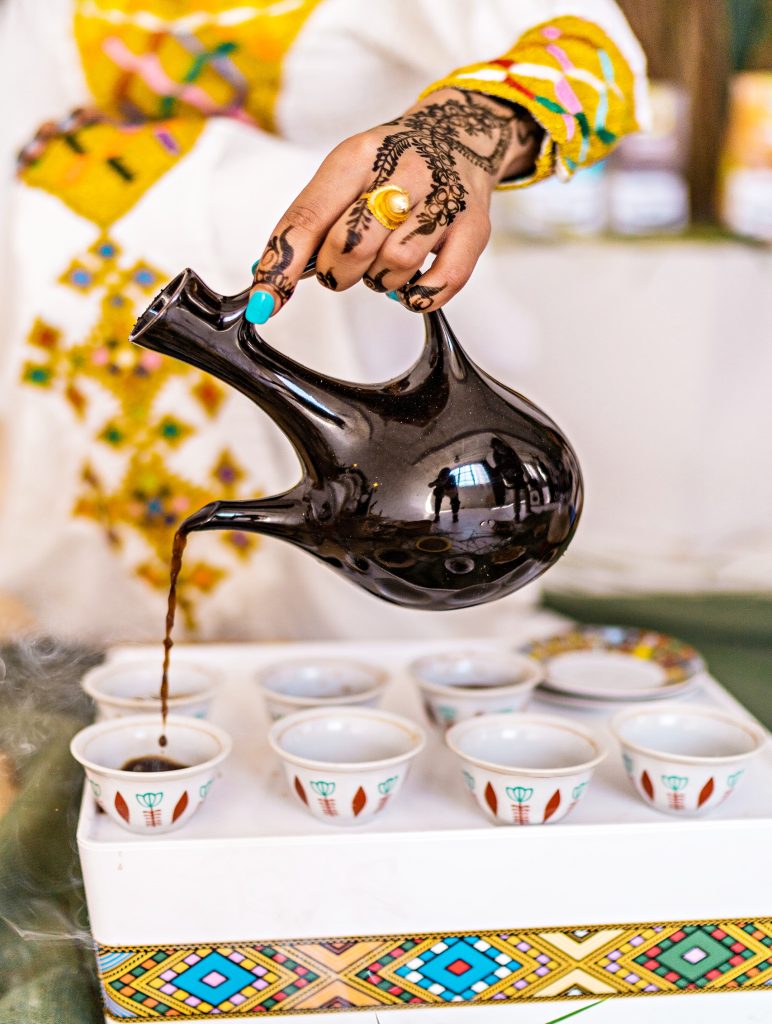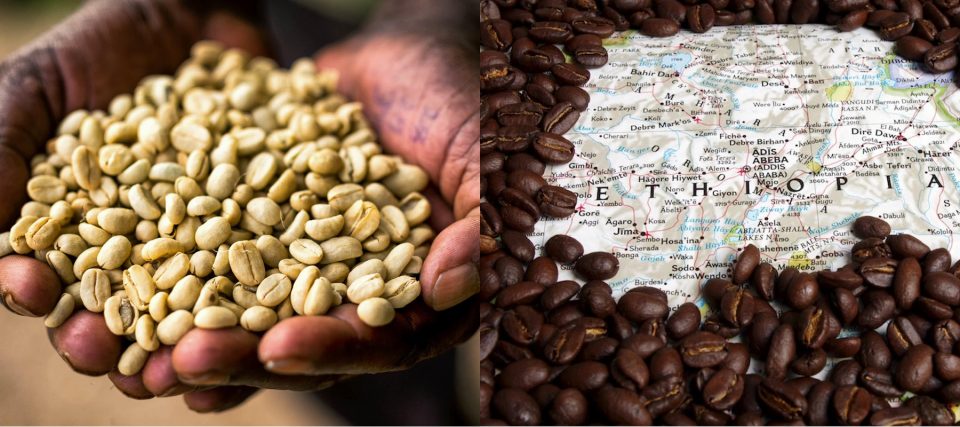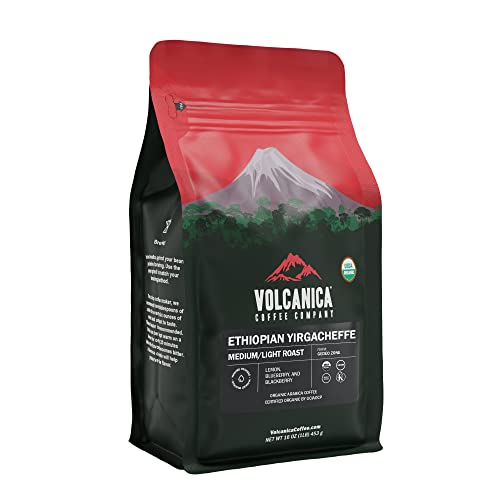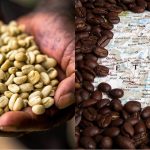Were you aware that Arabica coffee originated in Ethiopia? There is an old story about a goat Herder in the 9th century discovering the java bean since he detected his flock becoming chilled after ingesting a specific kind of berry. Those berries finally became called java beans, and their popularity spread rapidly throughout Africa and the Arabian peninsula. Whether that story is true or not, coffee’s existed in Ethiopia for decades.
Thus, if you’re trying to find the greatest tasting java, you might have noticed there are an infinite number of options in the marketplace now. We are here to assist! We have narrowed the list to seven java and provided reviews for everyone, thus providing you with the most excellent purchasing guide for java. Please keep reading to our best-of list.
01) Volcanica’s Ethiopian Coffee
If you’re supposed to trust one Ethiopian coffee manufacturer, it is probably this one. Volcanica’s Ethiopian Yirgacheffe is a testament to the extremely large standing of the area. An intricate blend of wine & fruit using appropriately bright acidity and a hint of cinnamon make this up cup. If you’re ever asked if Yirgacheffe beans live up to the hype, simply hand the confused individual a cup of this, and wait for them to be enlightened.
Volcanica’s Ethiopian Yirgacheffe bean was reverted as exotic, subtropical, as well as authentic. And if you’d opt to enjoy the distinctive ornate tastes of an Ethiopian Yirgacheffe beverage while not the energy increase, Volcanica provides a decaf Yirgacheffe bean that’s also roasted to order.
02) Cubico’s Ethiopia Yirgacheffe
This single-source product is provided by the Birhanu family farm. Ladies and gentlemen, it doesn’t get much better than this. An intricate collection of floral & grape notes has been highlighted by the colorful citrus-toned acidity which Ethiopian beans are famous for. An extremely unexpected, nevertheless seamless transition into a wonderful chocolate end makes this one brightly complete cup of java. There are uncounted Ethiopian coffee makers on the market, nevertheless, Cubico provides something extremely unique!
03) Coffee Bean Direct Ethiopian Whole Bean Coffee
Coffee Bean Direct includes a Dark Ethiopian Yirgacheffe assortment in legumes which can be equally USDA Organic and Fair Trade Certified. Additionally, it gives the Ethiopian Yirgacheffe in mild roast and maybe even roasted. The dark roast has a taste of lemon, baker’s chocolate, and blueberry. We value that the provider claims to exercise small-batch roasting, that retains the legumes shinier, but there aren’t any roast dates published on the bags. The quality could be unpredictable from bag to bag.
Additionally, Coffee Bean Direct doesn’t specifically name its origin for the java beans outside, which they’re out of the Yirgacheffe area of Ethiopia. The lightness of this roast contributes to some sweet and sour acidity and highlights the intricate flavor profile. You will detect flowery notes alongside lemon, honey, and lemon ones. All this has a smooth, velvety body.
04) Marley Coffee’s One Love Ethiopian Coffee
Marley Coffee’s One Enjoy 100% Ethiopian Coffee Whole Bean is by an organization that cares deeply about sustainability and ethical business practices, therefore if that is valuable to you, then you may want to encourage this particular brand. The coffee is Fair Trade Certified and spouses with One Tree Planted for forest sustainability. The beans are medium-roasted and have a tasty, smooth flavor.
Nonetheless, this is not the same One Love formula that Marley Coffee once needed. Additionally, it is currently a mix of Ethiopian java, so you can not predict the taste notes.
05) Equal Exchange’s Organic Whole Bean Coffee (Ethiopian)
Equal Exchange is your coffee firm that attracted the Fair Trade policy with little coffee farmers into the U.S., therefore it is called a highly ethical business. Its Ethiopian assortment of coffee beans is USDA Organic and Fair Trade Certified. It’s taste notes of chocolate, peppermint, and ginger.
There’s no information concerning the roast instances of these legumes, and there aren’t any roast dates published on the bags. The organization doesn’t expressly name the source because of its beans, besides they are from Ethiopia. Additionally, it is a considerably darker roast than anticipated, since the provided graph makes it look like it might be somewhere between a mild and medium beverage.
Buyer’s Guide For Ethiopian Coffee

If you are wondering just what to search for while searching for Ethiopian coffee, then we have got you covered. Please continue reading for our purchasing guide.
Origin
The finest Ethiopian coffees are going to be those out of one source since they have predictable taste profiles. This is very good for people who prefer to try out a java, fall in love with it, and stay with it. Usually, the more particular a provider is all about where exactly they obtained their coffee beans, the greater the grade of the java.
Organic
A natural seal in the bag guarantees that no artificial chemicals or pesticides came into contact with the coffee beans, and it can be a definite plus. But a few of the java listed are from wild coffee plantations (such as Volcanica) or by family farms that use natural farming techniques (such as Cubico). It is valuable to find out more about the company before purchasing a coffee bag from them.
Fair Trade
A Fair Trade certification guarantees that the growers and farmers of their java were treated in an ethical manner, particularly in a state where the majority of the coffee grown has been exported.
Roasting Times
The business should say if the coffee is freshly roasted when ordered or what their particular roasting policy is. The earlier it is roasted, the fresher the java. Therefore the roasting time has to be within fourteen days. Additionally, it is valuable to have a roast date published in the bag, which means that you can be sure when exactly the beans have been roasted.
Flavors
Ethiopian coffee has a floral and fruity flavor, but a number of the types are more citrusy and sour than many others. If you do not like one sort, make sure to try out a different, as it is all dependent on the particular farm and area in Ethiopia.
Conclusion
Many Ethiopian coffee farmers operate tiny land (sometimes fewer than five acres), and several provide organic coffee beans.
The washing and drying of the coffee beans on these small coffee farms must be done on-site, due to a few transportation options.
Suppose you enjoy a cup of java that will wake your mind and your taste buds. In that case, Ethiopian coffee purchases are a terrific choice to encourage modest farmers and revel in fantastic, well-flavored java.
Video: Ethiopian Coffee Ceremony – How to Drink Traditional Coffee!
If you are like us and are interested in coffee culture and traditions from different parts of the world, make sure to check out our Colombian coffee review as well.









